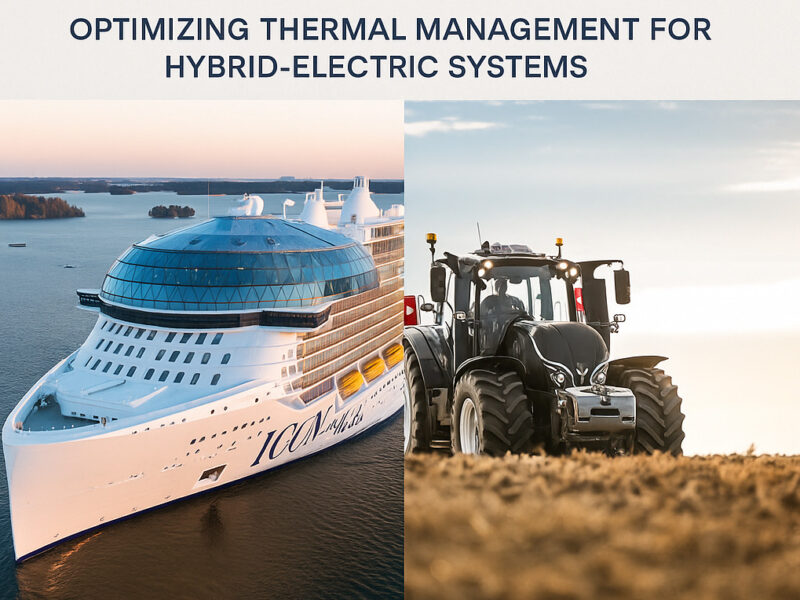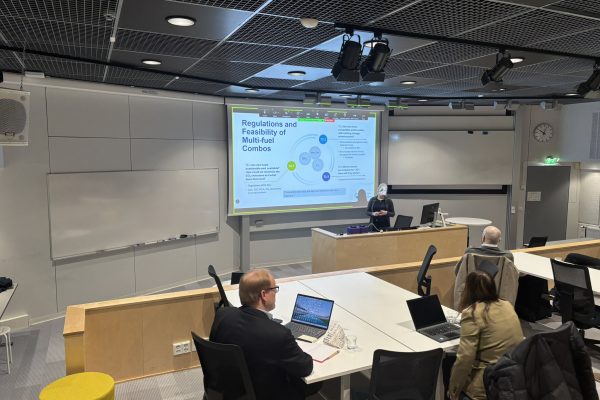
WP5 Leader Pasi Peltoniemi
In Flexible Clean Propulsion Technologies (Flex-CPT), Work Package 5 (WP5) focuses on optimizing thermal management solutions for hybrid-electric systems using flexible fuels. The goal is to find and demonstrate the best approaches to ensure future marine and non-road mobile machinery meet performance and emission targets through efficient hybridization.
Hybridization is a key enabler for future propulsion systems. In WP5, researchers concentrate on developing advanced power and energy management methods for hybrid powertrains, integrating battery systems with flexibly-fueled RCCI engines. Special attention is given to thermal management challenges, an essential factor in ensuring system reliability and efficiency in demanding applications.
![]()
![]()
According to WP5 Leader Pasi![]() Peltoniemi from LUT University, the most exciting aspect of the work is exploring different thermal management solutions and determining which ones perform best in various hybrid system configurations. “All research units work together to discover the most suitable thermal management solutions for flexible fuel hybrid systems,” he explains, highlighting the strong collaboration across the WP5 team and with other Work Packages. The work has started actively, with initial experimental tests already completed and thermal modeling of powertrain components ongoing. Work package addresses several key thermal management challenges, particularly in the context of hybrid systems operating in demanding environments like marine vessels and non-road mobile machinery (NRMM). These challenges include managing battery temperature under high load and fast-charging conditions, especially in cold Nordic climates. Another challenge is integrating passive cooling methods, such as phase change materials (PCMs), to maintain optimal battery performance without excessive energy consumption. WP5 also explores thermoelectric generation as a means to recover waste heat and improve overall system efficiency. Additionally, ensuring thermal stability across various hybrid configurations that combine batteries with RCCI engines running on flexible fuels is a critical focus.
Peltoniemi from LUT University, the most exciting aspect of the work is exploring different thermal management solutions and determining which ones perform best in various hybrid system configurations. “All research units work together to discover the most suitable thermal management solutions for flexible fuel hybrid systems,” he explains, highlighting the strong collaboration across the WP5 team and with other Work Packages. The work has started actively, with initial experimental tests already completed and thermal modeling of powertrain components ongoing. Work package addresses several key thermal management challenges, particularly in the context of hybrid systems operating in demanding environments like marine vessels and non-road mobile machinery (NRMM). These challenges include managing battery temperature under high load and fast-charging conditions, especially in cold Nordic climates. Another challenge is integrating passive cooling methods, such as phase change materials (PCMs), to maintain optimal battery performance without excessive energy consumption. WP5 also explores thermoelectric generation as a means to recover waste heat and improve overall system efficiency. Additionally, ensuring thermal stability across various hybrid configurations that combine batteries with RCCI engines running on flexible fuels is a critical focus.
Work explores hybrid-electric powertrain configurations that integrate battery energy storage systems with Reactivity Controlled Compression Ignition (RCCI) engines capable of operating on multiple fuel types such as hydrogen, ammonia, methanol, and diesel. These configurations are tailored for marine and NRMM applications, where high power and energy demands require robust and flexible system architectures. The research also considers onboard charging systems and thermal integration with aftertreatment systems and fuel storage components.
WP5 is deeply interconnected with other Work Packages. It collaborates with WP1 and WP2 on engine modeling and integration of thermal systems with combustion technologies. WP3 provides insights on fuel storage compatibility and the impact of fuel blends on system design. WP4 coordinates on thermal management of aftertreatment systems, especially regarding emissions control and catalyst performance. In addition, WP5 works closely with industrial partners such as AGCO Power, Wärtsilä, Meyer Turku, Bosch Rexroth, and Lumikko, who provide real-world use cases, testing platforms, and feedback for validating the developed solutions.
Over the next two and a half years, WP5 will focus on delivering advanced concepts for thermal management, onboard charging solutions tailored to non-road mobile machinery (NRMM), and robust battery lifetime modeling tools. These outcomes are essential for developing reliable, low-emission hybrid systems that meet the performance demands of future transport technologies.
The work package also places a strong emphasis on marine vessels and NRMM applications. Testing efforts will address the challenges posed by harsh Nordic climate conditions, with particular attention given to optimizing battery performance and enabling fast-charging capabilities under real-world operating environments.
WP5 introduces several innovations that go beyond conventional thermal management. These include the use of PCMs for passive battery cooling, which reduces the need for active cooling systems and improves energy efficiency. Another innovation is thermoelectric generation to convert waste heat into usable electrical energy, enhancing overall system sustainability. WP5 also focuses on integrated modeling and control of thermal behavior across hybrid systems, enabling predictive and adaptive management strategies. Furthermore, system-level optimization is considered, taking into account the interaction between thermal, electrical, and mechanical subsystems in hybrid configurations. These innovations aim to deliver more efficient, compact, and environmentally friendly solutions for future propulsion systems.
Pasi Peltoniemi brings extensive expertise to the Flex-CPT project. He earned his D.Sc. degree in Electrical Engineering from LUT University in 2010, where he also completed his Master’s degree with honors. Following his doctoral studies, he served as a post-doctoral researcher at the Laboratory of Control Engineering and Digital Systems at LUT. After several years advancing research in electrical drives and DC systems, he was appointed Associate Professor (tenure track), and in 2023, he became a Full Professor and Head of the Laboratory of Electrical Drives and Power Electronics at LUT University’s School of Energy Systems. His research interests span electrical drives, grid-connected converters, distributed generation, power-to-X (P2X) systems, and DC grids. Throughout his career, Peltoniemi has been actively involved in major research projects and technology development initiatives, significantly contributing to innovations in sustainable energy and power electronics.
WP5 plays a vital role in ensuring Flex-CPT’s success by combining multi-fuel propulsion innovations with smart hybrid solutions, paving the way for cleaner, more flexible transport technologies.
By the end of the project, WP5 aims to deliver a thermal management concept for NRMM applications, including the demonstration of PCM-based battery cooling. It also aims to provide a robust battery lifetime model that accounts for hybrid operation cycles, enabling better prediction of battery degradation and supporting lifecycle optimization. These achievements will contribute significantly to the development of low-emission, high-performance hybrid systems that are ready for deployment in marine and off-road applications



